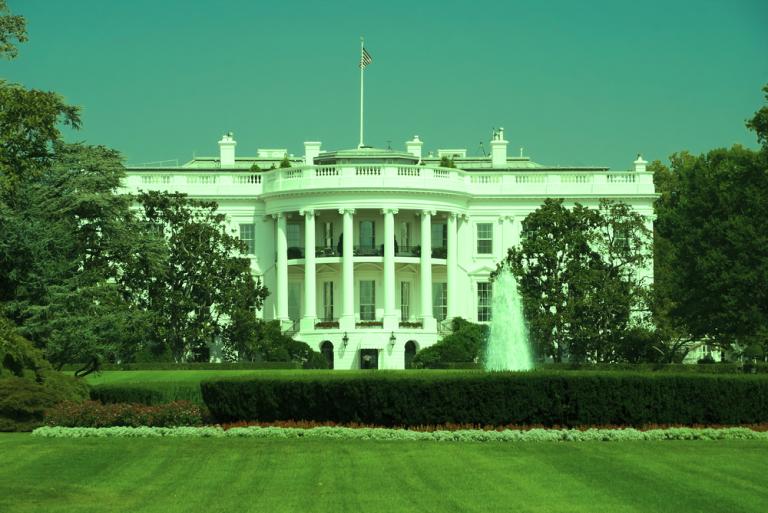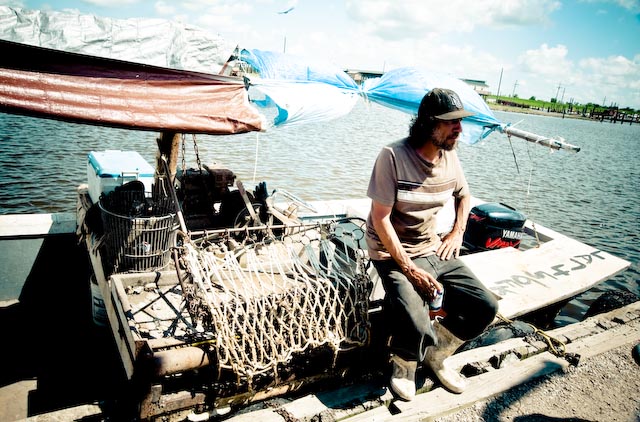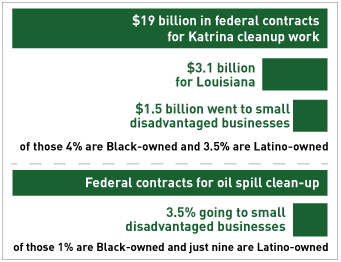When reporting on the BP oil disaster five years ago, I discovered that people of color and humble income were often left out of the frenzy of economic activity generated by the emergency response and recovery efforts.
In August 2010, four months into the cleanup, I looked at the contracts doled out by the U.S. government for services including charter transportation, hazmat training, legal consultation, scientific studies, housing, food, tech, and equipment. According to the Federal Procurement Data System, which is updated weekly, just 3.5 percent of the dollars spent by the government on the recovery went to small disadvantaged businesses.
Of 410 vendors, only five were African-American owned. Nine were Latino-owned. This, despite the fact that the Gulf states had (and still have) the highest concentrations of African Americans and black-owned businesses in the country, and some of the fastest rising Latino populations.
Today, five years later, the numbers from the procurement data system show that things didn’t much improve. The U.S. government has spent $600 million on the Gulf oil disaster recovery — some of which came from BP, but not all of it. As of this week, the number of small disadvantaged businesses with contracts has only reached just above 5 percent. Of the roughly 1,478 companies that have received contracts since the beginning, just 140 are owned by minorities. Only 20 are black-owned and 30 are Hispanic-owned. Despite the sizable Native-American population across most of Louisiana’s coast, only 16 Native-American businesses won contracts. We’re talking between 1 and 2 percent for every racial category.
The BP disaster is no aberration. For Hurricane Katrina, less than 8 percent of contracts went to small disadvantaged businesses. And it’s not just the Gulf Coast where people of color are getting the short end. The U.S. government has spent over $2.1 billion in procurement for Hurricane Sandy. Only about 8 percent of those contracts have gone to small disadvantaged business, and only 3.5 percent for women-owned businesses.
How many minority-owned businesses actually provide these services? That’s a fair question. But bear in mind that vendors from across the nation got Gulf disaster recovery dollars. The biggest one-time sum, for $47 million, was a non-competitive bid contract awarded to a vendor based in Massachusetts.
A lot of small boaters, fishers, and oil workers were put to work in the emergency phase of the oil clean-up. Employed through the Vessels of Opportunity program, these workers used their own boats, many of them their own gear, and their native expertise and knowledge of working Gulf waters to help get the oil out. But once the Vessels program closed down after the worst of it was sopped up, many of those workers had to rely on the thorny, tangled up claims and litigation process to recuperate their losses.
Many of these were Vietnamese and Native-American fishers, African-American oystermen, and just-above-profit-margin independent businessmen clearly at a disadvantage compared to the larger charter boat operators cleaning up in contracts across the coast. Those vulnerable populations, who lost the most in the disaster, deserved a larger portion of the recovery benefits. And who better to make that happen than the federal government, which is required to look out for the most vulnerable in ways that a huge multinational company like BP is not?
It’s the least the U.S. government could do, given that BP seems to have left a lot of those disadvantaged businessmen and fishermen still aching for fair compensation. Yesterday, a coalition of Gulf residents and activists accompanied a group of Vietnamese fishers to BP’s U.S. headquarters in Houston in hopes that BP officials would meet with them. BP refused.
The company also rejected a petition of close to 120,000 signatures from people irked with the company’s efforts to seek tax write-offs for the funds it has spent on the recovery. The Gulf Restoration Network says that as much of 80 percent of BP’s expenditures are tax eligible, which, if true, means that the government is essentially helping to subsidize the company’s penalties. Translation: BP gets to recover, while those most devastated by its disaster remain economically damaged.
With more disasters certain to come due to fossil-fueled climate change, we need to keep an eye on who profits from the recovery efforts. Otherwise, the populations that tend to suffer the most will be left out even from the efforts to put their communities back together.




